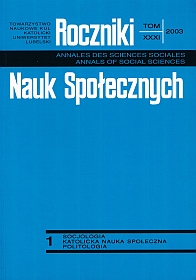Local Government Estate Administration in Poland in the Times of the Piasts
Abstract
The local estate government in the countryside appeared in Poland at the turn of the 12th and 13th centuries, in the historical period when the disruption of the state unity caused the situation in which much more emphasis was put on the internal issues of the Polish society than on purely political affairs. There was a number of factors that contributed in the formation and the development of local countryside administration, among which the most important to be mentioned are regime, legal, economical, demographic, social, ideological and philosophical transformations. This institution was closely connected with the contemporaneous process of settlement based on a German law. The competences of the local countryside administration resulted from the colonization itself, the basis of which was a location act of a new local communal unit. One of the duties of the local administration was to provide the members of the local community with services whose main aim was to satisfy a basic need for security and protection, both according to the legal system as well as to the peasantry's interests. Local countryside administration, called upon by the volitional decision of the landowners and supervised by the state authorities, constituted a partial representation of the peasantry. Its activities were confined to few commissioned issues such as lower judiciary system and supervising the peasantry that were related to the peasantry's duties resulting from the feudal dependence.
References
Bardach J., Leśnodorski B., Pietrzak M.: Historia ustroju iprawa polskiego, Warszawa 1998.
Gloger Z.: Encyklopedia staropolska, t. 1, Warszawa 1978.
Gończar M.: Samorząd wsi; historia i nowe możliwości, Warszawa 1990.
Grodecki R.: Polska piastowska, Warszawa 1969.
Grodecki R.: Zagadnienie feudalizmu w Polsce, Kraków 1930.
Grodecki R., Zachorowski S., Dąbrowski J.: Dzieje Polski średniowiecznej, t. 1, Kraków 1995.
Historia chłopów polskich, red. S. Inglot, t. 1, Warszawa 1970.
Historia chłopów polskich, red. S. Inglot, Wrocław 1992.
Inglot S.: Historia gospodarcza. Zarys dziejów: starożytnych, średniowiecznych, nowożytnych, nowoczesnych, Wrocław 1949.
Inglot S.: Historia społeczna i gospodarcza średniowiecza, Wrocław 1949.
Inglot S.: Z dziejów wsi polskiej i rolnictwa, Warszawa 1986.
Łowmiański H.: Przemiany feudalne wsi polskiej do 1138 r., „Przegląd Historyczny” 1974, z. 3.
Modzelewski K.: Chłopi w monarchii wczesnopiastowskiej, Wrocław 1987.
Modzelewski K.: Organizacja gospodarcza państwa piastowskiego X-XIIIw., Wrocław 1975.
Modzelewski K.: Organizacja opolna w Polsce piastowskiej, „Przegląd Historyczny” 1986, z. 2.
Świętochowski A.: Historia chłopów polskich w zarysie, Warszawa 1947.
Tymieniecki K.: Procesy twórcze formowania się społeczeństwa w wiekach średnich, Warszawa 1921.
Tymieniecki K.: Historia chłopów polskich, t. 1, Warszawa 1965.
Tymieniecki K.: Z metodyki nad starożytnościami słowiańskimi, „Przegląd Historyczny” 1948, z. 1.
Wasilewski T.: O służbie wojskowej ludności wiejskiej i składzie społecznym wojsk konnych i pieszych we wczesnym średniowieczu polskim, „Przegląd Historyczny” 1960, z. 1.
Wójcik S.: Samorząd terytorialny w Polsce w XX wieku. Myśl samorządowa. Historia i współczesność, Lublin 1999.
Copyright (c) 2003 Roczniki Nauk Społecznych

This work is licensed under a Creative Commons Attribution-NonCommercial-NoDerivatives 4.0 International License.


